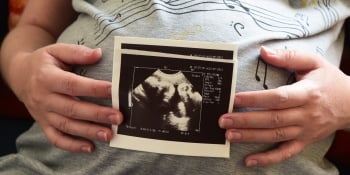Published: 25.03.2024

How should Polish doctors affirm the right to life amid the efforts of the ruling coalition and Prime Minister Donald Tusk to legalize abortion in Poland, despite the constitutional protection of life from the moment of conception?
A commentary on the new recommendations of the Polish Society of Gynecologists and Obstetricians from Prof. Bogdan Chazan and legal counsel Katarzyna Gęsiak.
(Prof. Bogdan Chazan is a well-known gynecologist-obstetrician in Poland. From 2004 to 2014, he was director of the Holy Family Specialty Hospital in Warsaw, from which he was fired for refusing to perform abortions. Legal counsel Katarzyna Gęsiak is the director of the Center for Medical Law and Bioethics at the Ordo Iuris Institute).
On February 23, 2024, the Polish Society of Gynecologists and Obstetricians published a revised text on the “Recommendations on the Application of the Law on Family Planning, Protection of the Human Fetus and the Conditions for Permissibility of Abortion.”
This is a professional document, one might say, as it recommends a course of medical action. It will have a major impact on medical practice, the behavior of doctors, and their approach to performing abortions “due to the risk to the health and life of the pregnant woman.” These recommendations also discuss the law. The position presented in the text does not reflect the current state of the law in Poland, and above all, it ignores the principle of legal protection of the life of conceived children, as recognized and repeatedly confirmed by the Constitutional Court. Instead, the recommendations are presented exclusively through the lens of women’s rights.
The issues discussed in the text are being vigorously discussed in the Sejm, the media, and private conversations. They concern the greatest human value – life – and, therefore, they concern all citizens.
It is questionable to count as abortion a situation in which a child dies in utero from medical interventions to save the mother. It is also difficult to accept the concept of liberalizing abortion due to a threat to the mental health of the mother. In Poland, this is supposed to substitute for eugenic abortion, as performed in other countries in cases of malformations and diseases of the conceived child. Of course, our biggest objection is the inclusion of the intentional killing of unborn human beings – in other words, abortion – as a therapeutic procedure.
The issuance of the Recommendations, long promised by the authorities, is a further reaction to the tragic events in several maternity wards in Poland. Several women and their babies died from pregnancy complications. The likely causes were septic complications of spontaneous miscarriages and deliveries. Investigations show that the medical management in these cases was substandard.
Following the example of Ireland, activists have used these tragic events to provoke changes to Poland’s current abortion law. The narrative in leftist circles maintains that the doctors caring for the women who died felt “frozen” by the current abortion law. Furthermore, these doctors feared being accused of performing a legally prohibited abortion, and they were told to wait until the fetus died before deciding to terminate the pregnancy.
In the street protests that took place at the time, and in the rhetoric in these circles today, there is a prevailing idea that the current abortion law has an adverse effect on women’s safety and even threatens their lives. A committee within the Health Ministry, appointed by the previous government, developed recommendations for addressing similar complications of pregnancy and childbirth, but the results of its work were unsatisfactory to the new Health Minister, Izabela Leszczyna.
The death of the baby while saving the mother’s life is not abortion
A mother’s life-threatening illness may be serious, and the complications of pregnancy severe.
(…)
It is unjustified to use the term “abortion” in relation to medical management of very difficult clinical situations, which in Poland have been the cause of death of several mothers. The term is used consciously in public debate as a means of achieving political and ideological goals. In obstetrics, during complications of pregnancy or childbirth, a child sometimes dies amid procedures undertaken to save the mother.
This is not an abortion, as such medical interventions are not intended to take the child’s life. Such practices therefore do not fall within the legal and medical realm of abortion. They are undertaken to save the endangered life of the mother and belong to the realm of medical necessity. The death of the child, if it occurs, is unintentional.
Abortion is defined in reputable dictionaries as a procedure aimed at terminating a pregnancy at an early stage to prevent the birth of a living child. It is therefore inherently directed against the life of the child and is intended to kill it, which is not the reality in cases of necessary medical measures performed to save the life of the pregnant woman.
(…)
One can therefore maintain that this type of situation should be removed from the legal realm of abortion. This could free doctors from the fear of criminal liability related to saving the mother’s life. The medical conduct in these cases will then, if necessary, be evaluated solely on compliance with medical knowledge and the recommendations of medical societies and laws other than the Family Planning Act.
This will allow doctors who save the lives of pregnant women to focus on the substantive side of the issue, not succumb to episodes of “freezing” for fear of being accused of performing an illegal abortion. Furthermore, it will permit them to act more effectively in difficult obstetric situations, without forgetting the duty in the Code of Medical Ethics to care simultaneously for the health and life of the mother and her unborn child. Law and medicine can then resume their proper places for the benefit of the health of mothers and children, and for the effective treatment of threats to their lives. Such reform will also reduce the scale of threats to the consciences of medical personnel.
Mental well-being must yield to the overriding right to life
Poland’s 1993 “Law on Family Planning, Protection of the Human Fetus and the Conditions for Permissibility of Termination of Pregnancy” states that the termination of a pregnancy can be carried out when the pregnancy poses a threat to the life or health of the pregnant woman. This is an exception to the principle enumerated in the Constitution and the law’s preamble that “the right to life shall be protected.”
Eugenic abortion, due to the diagnosis or suspicion of disease or malformation of the child, is not currently permitted. Mothers who experience stress because of this and are unable or unwilling to utilize available medical, psychological, or material support thus would allegedly be eligible for abortion on the grounds of mental health risks. Leftist media are broadcasting the narrative that women are afraid to get pregnant if they lack the option of abortion when it turns out that the child is sick.
In the Recommendations, abortion in situations that threaten the mental health of the mother is presented as a “determining premise” or even as a “medical indication.” It is difficult not to view this interpretation of the law as an encouragement, or even a recommendation, to doctors to perform abortions in such situations. It is not uncommon for women to experience stress, discomfort, or anxiety at the news of an unexpected pregnancy, even when prenatal tests do not indicate a disease in the child. This will constitute, according to the newly issued text, a “medical indication” for termination of pregnancy.
In medicine, the term “indication” is used in situations in which there are vital reasons for medical intervention. A broken leg is an indication for a cast, and appendicitis is an indication for surgery. What woman would dare to object if a doctor says that her anxiety or fear about her pregnancy is a medical indication for terminating the pregnancy?
Certain opinions in Recommendations raise serious doubts. These include assertions that “termination of pregnancy” is a standard medical procedure that does not require specialized equipment, and that, if “indications” for its performance due to a threat to the health or life of the pregnant woman are established, then “it is possible to perform it in any gynecology and obstetrics department.” The text maintains that “every hospital is obliged to provide professional, dignified, and safe conditions for carrying out this procedure.” In this way, it mandates that all hospitals must fully comply with the provisions of their contracts with the National Health Fund, and that none can be exempted from an obligation to kill children. All hospitals are to “have no conscience,” the Minister said.
The recommendation to treat “termination of pregnancy” as a standard medical procedure that can be carried out in any department is unreasonable and will expose the mother to additional dangers.
Recall that, according to the law, the “termination of pregnancy” procedure can be performed in cases of danger to the life and health of the mother, during any period of pregnancy, regardless of its duration. This includes the stages when the pregnancy is advanced and the baby is already viable outside the mother’s body.
If such a procedure occurs in the final stage of pregnancy, the availability of equipment to monitor the condition of the child is necessary. That is unless doctors, contrary to their legal obligations, decide they are uninterested in the condition of the baby during induced labor for the purpose of carrying out an abortion procedure. Such circumstances would also require neonatal intensive-care equipment and experienced neonatology personnel to care for a newborn who unexpectedly may be born alive in defiance of its death sentence and despite an exhaustive abortion procedure.
It is doubtful whether every hospital providing primary care and obliged by the wording of the Recommendations to perform a “dignified and safe abortion” will provide facilities for psychological support and psychiatric treatment, which, according to the text’s wording, is the responsibility of the doctor caring for the pregnant woman. The issue of abortion for mental health disorders is addressed in the Recommendations, but no provision exists for including specialists in psychology and psychiatry in the attending medical team.
The termination of an advanced pregnancy is a very serious procedure. Such a procedure itself can cause serious complications to the mother’s health. The internet contains wholesome descriptions of an operation called “abortion by partial birth” or “partial-birth abortion,” in which, to reduce the volume of the baby’s head, the contents of the head are sucked out. It is difficult to imagine such a procedure being performed safely in any hospital, even one “without a conscience.” The text, of course, makes no mention of eliminating the suffering of the aborted child.
On the other hand, it emphasizes that “mental health is a fundamental personal good of the human being, and the protection of the rights of people with mental disorders is one of the duties of the state.” It draws the direct conclusion that “termination of pregnancy is permissible when the continuation of the pregnancy is a threat to the mental health of the pregnant woman.” Activists are attempting to convince the public that abortion is one of the rights of a woman with a mental disorder, and that the right to abortion in a situation of abnormal, though difficult to define in a particular case, “mental well-being” is more important than the right to life of an innocent child.
Thus, they speak directly about the right to abortion as a human right, which, however, does not exist in the human rights system. The current practice in some hospitals in Poland proves that children are deprived of their lives, including at an advanced stage of gestation, due to “adaptive disorders” of pregnant women, and thus without the presence of severe mental illness.
In 2006, Professor Andrzej Zoll, Ph.D., a former president of the Constitutional Tribunal, wrote in an opinion for the Office of Parliamentary Analyses that a doubt arises in relation to the second premise (allowing the termination of pregnancy if it poses a threat to the health of the pregnant woman) due to the undefined threat to the woman’s health. He stated that “today’s formulation of this premise is not an adequate safeguard for the life of the conceived child.”
Former Commissioner for Human Rights Janusz Kochanowski expressed similar doubts in a draft motion to the Constitutional Court on the question of whether Article 4a(1)(1) of the Family Planning Act is unconstitutional to the extent that the provision uses the undefined term “danger to the health of the pregnant woman.”
Suggesting to doctors and parents the permissibility of abortion due to so-called “conditions” or “medical indications” regarding the mental health or psychological well-being of mothers probably does not consider the reality in some countries, in which the number of abortions performed for this reason is counted in the tens of thousands and is steadily increasing. Such a loss of children could also occur in Poland and magnify the size of the current demographic disaster.
In addition, scientific studies confirm that abortion often causes serious mental problems, chronic depression, and suicide. Thus, the mental health of a huge population of women may deteriorate. Above all, however, we should not be indifferent to the fate of the children being killed.
The Recommendations text does not provide solutions to practical problems and is full of contradictions
(…)
Several other contradictions can be seen in the Recommendations text. On the one hand, it accepts the intention to kill the “fetus” before birth due to the abnormal psychological well-being of the pregnant woman. On the other hand, it recommends saving the child, the would-be victim of this procedure who managed to survive, and calls this child (and rightly so) a newborn baby.
It is recommended that the well-being of the child be considered when making “therapeutic” decisions (abortion is here unlawfully referred to as treatment of a disease). The word “mother” does not appear once in the Recommendations text. And yet it is common knowledge that the mother remains the mother of the murdered child after an abortion, for the Constitution itself, in Article 72(2), stipulates that the mother is the woman both before and after the birth of the child.
If an abortion is “necessary” after 22 weeks of pregnancy, it is recommended that “a treatment plan be established for the child after birth” and that the “patient” be informed of it. In one moment, there is the fetus, deprived of all rights, and a moment later, the child, whose life is to be protected. This second aspect is a good thing. After all, so recently, children who managed to survive an abortion were dying alone, unattended, cold, and suffocating. One should also note that the recommendations of foreign scientific societies propose “preventing” the birth of a live baby after an abortion by injecting potassium chloride or digoxin into the abdominal cavity. This, fortunately, is not present in the Polish Recommendations.
Proposed Solutions
We propose abandoning the classification of an unintentional death of a child while saving the life of a pregnant mother as an “abortion.” Such a development does not meet the definition of abortion, the purpose of which is the intentional deprivation of the life of a conceived child. This will avoid unnecessary stress for doctors involved in providing medical assistance to the mother, and it will improve the efficiency and effectiveness of the management of severe obstetric complications. It can further contribute to avoiding conflicts of conscience of medical personnel.
We believe that, instead of offering abortions to mothers for their shattered “psychological well-being,” appealing to “medical indications” that are controversial in these situations or invoking nonexistent abortion “rights,” the state should provide mothers with proper medical, psychological, and material support for their families. Children should be allowed to be born, with the understanding that human life is protected by law from the moment of conception.
We encourage medical practitioners to act according to this bioethical principle: “First, do no harm.”
This opinion piece was first published in Polish in the Do Rzeczy weekly in March 2024 and translated by Sovereignty.pl.

· The European Parliament adopted a resolution calling for the inclusion of the so-called right to abortion in the Charter of Fundamental Rights of the European Union.

· The anti-life projects proposed by our ruling coalition are only the beginning of a political process leading to the normalisation of the mass killing of unborn children.
· The French law of 1974, which was only supposed to open the floodgates to prenatal killing for women in distress, in fact established a new legal foundation through which almost a quarter of a million children lose their lives in France every year.

· Abortion advocates manipulate human rights slogans which remain relevant to Polish citizens in order to force the public into supporting abortion.